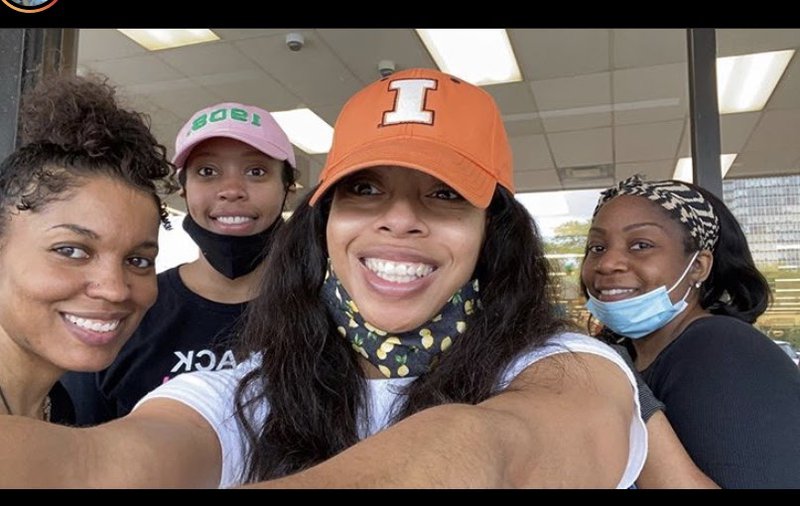Since You Asked: Mallory Littlejohn
Blog Post

July 8, 2020
Mallory Littlejohn (far right) and friends, Dhaviella Harris, Veronica Bowen, and LeDeidre Turner (l-r) volunteered to clean up shops in their community after looting following peaceful protests in Chicago.
A long-time resident of the Bronzeville neighborhood, Mallory Littlejohn is the Legal Director at the Chicago Alliance Against Sexual Exploitation. A graduate of John Marshall Law School, Mallory coaches the Black Law Students Academic team and was recently voted in as Board Chair at local nonprofit, Foster Progress. Mallory recently chatted with Chicago Fellow, Meegan Dugan Bassett, about the disconnect between media coverage and her experience in the community following the murder of George Floyd.
MDB: People all over Chicago turned out for peaceful protests the weekend of May 30th, which was incredible. But there were also some clashes between groups and some looting.
>>ML: I’ve been really frustrated because I really haven’t been seeing anything in the news about what actually happened in Bronzeville that weekend. On Sunday, we started seeing all these groups of cars drive into the neighborhood. Lots of them had Indiana plates, so I knew many of them weren’t from our neighborhood. People started looting the Walgreens and the one grocery store in our neighborhood. I saw someone walking out with a cash register. The next day some of my neighbors and I went to see if we could help clean things up. It was crazy. There was broken glass everywhere. Someone had peed all over the store, so it smelled terrible. We got to work cleaning it up because we wanted the stores to open. Where are elderly people or people without cars supposed to go to get food if the one grocery store is closed? At one point a police officer came by and asked us some questions, thinking we worked there. I told her we were just neighbors who wanted to help. She started crying. It was a really touching moment.
MDB: Many people may not know how the official city response to the protests impacted communities of color.
>>ML: I’m lucky, because I have a car. The CTA was shut down and a lot of highway exits were closed to keep people out. Since the local grocery store was closed I tried to drive to get food the next day. But, all the exits were closed for miles. There was a checkpoint on Lake Shore Drive. I told them I just needed to get food for my dog and they let me through at the first one, but not the next one. I ended up having to drive and drive. I finally ended up going to the grocery store in Skokie. But, the CTA was closed. For people without a car, I don’t know how they would get food.
MDB: What do you think people would be surprised about?
>>ML: The struggle people had the first day or two getting super basic things. For example, struggling to find an ATM to pay rent or a place to buy milk and diapers for babies. Because media coverage was minimal, the community had no idea their grocery store was not open.